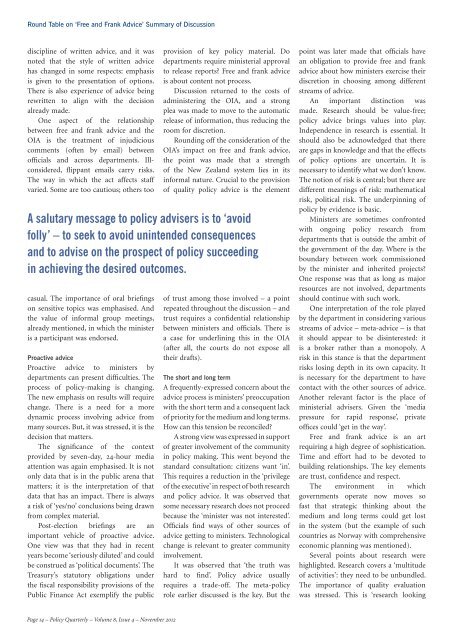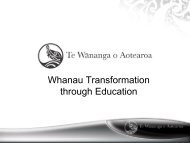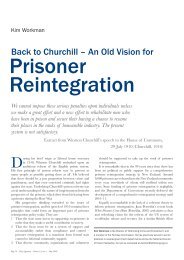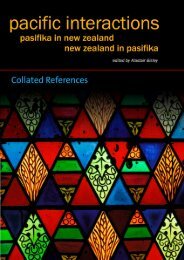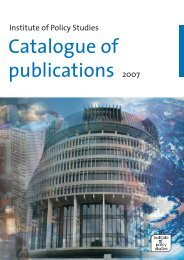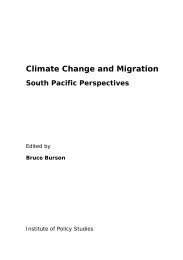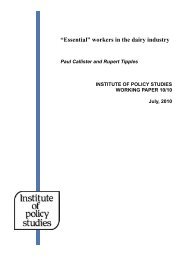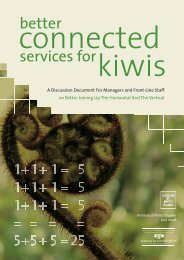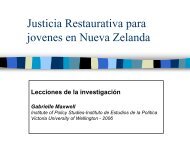PDF File - Institute for Governance and Policy Studies - Victoria ...
PDF File - Institute for Governance and Policy Studies - Victoria ...
PDF File - Institute for Governance and Policy Studies - Victoria ...
Create successful ePaper yourself
Turn your PDF publications into a flip-book with our unique Google optimized e-Paper software.
Round Table on ‘Free <strong>and</strong> Frank Advice’ Summary of Discussion<br />
discipline of written advice, <strong>and</strong> it was<br />
noted that the style of written advice<br />
has changed in some respects: emphasis<br />
is given to the presentation of options.<br />
There is also experience of advice being<br />
rewritten to align with the decision<br />
already made.<br />
One aspect of the relationship<br />
between free <strong>and</strong> frank advice <strong>and</strong> the<br />
OIA is the treatment of injudicious<br />
comments (often by email) between<br />
officials <strong>and</strong> across departments. Illconsidered,<br />
flippant emails carry risks.<br />
The way in which the act affects staff<br />
varied. Some are too cautious; others too<br />
casual. The importance of oral briefings<br />
on sensitive topics was emphasised. And<br />
the value of in<strong>for</strong>mal group meetings,<br />
already mentioned, in which the minister<br />
is a participant was endorsed.<br />
Proactive advice<br />
Proactive advice to ministers by<br />
departments can present difficulties. The<br />
process of policy-making is changing.<br />
The new emphasis on results will require<br />
change. There is a need <strong>for</strong> a more<br />
dynamic process involving advice from<br />
many sources. But, it was stressed, it is the<br />
decision that matters.<br />
The significance of the context<br />
provided by seven-day, 24-hour media<br />
attention was again emphasised. It is not<br />
only data that is in the public arena that<br />
matters; it is the interpretation of that<br />
data that has an impact. There is always<br />
a risk of ‘yes/no’ conclusions being drawn<br />
from complex material.<br />
Post-election briefings are an<br />
important vehicle of proactive advice.<br />
One view was that they had in recent<br />
years become ‘seriously diluted’ <strong>and</strong> could<br />
be construed as ‘political documents’. The<br />
Treasury’s statutory obligations under<br />
the fiscal responsibility provisions of the<br />
Public Finance Act exemplify the public<br />
provision of key policy material. Do<br />
departments require ministerial approval<br />
to release reports Free <strong>and</strong> frank advice<br />
is about content not process.<br />
Discussion returned to the costs of<br />
administering the OIA, <strong>and</strong> a strong<br />
plea was made to move to the automatic<br />
release of in<strong>for</strong>mation, thus reducing the<br />
room <strong>for</strong> discretion.<br />
Rounding off the consideration of the<br />
OIA’s impact on free <strong>and</strong> frank advice,<br />
the point was made that a strength<br />
of the New Zeal<strong>and</strong> system lies in its<br />
in<strong>for</strong>mal nature. Crucial to the provision<br />
of quality policy advice is the element<br />
A salutary message to policy advisers is to ‘avoid<br />
folly’ – to seek to avoid unintended consequences<br />
<strong>and</strong> to advise on the prospect of policy succeeding<br />
in achieving the desired outcomes.<br />
of trust among those involved – a point<br />
repeated throughout the discussion – <strong>and</strong><br />
trust requires a confidential relationship<br />
between ministers <strong>and</strong> officials. There is<br />
a case <strong>for</strong> underlining this in the OIA<br />
(after all, the courts do not expose all<br />
their drafts).<br />
The short <strong>and</strong> long term<br />
A frequently-expressed concern about the<br />
advice process is ministers’ preoccupation<br />
with the short term <strong>and</strong> a consequent lack<br />
of priority <strong>for</strong> the medium <strong>and</strong> long terms.<br />
How can this tension be reconciled<br />
A strong view was expressed in support<br />
of greater involvement of the community<br />
in policy making. This went beyond the<br />
st<strong>and</strong>ard consultation: citizens want ‘in’.<br />
This requires a reduction in the ‘privilege<br />
of the executive’ in respect of both research<br />
<strong>and</strong> policy advice. It was observed that<br />
some necessary research does not proceed<br />
because the ‘minister was not interested’.<br />
Officials find ways of other sources of<br />
advice getting to ministers. Technological<br />
change is relevant to greater community<br />
involvement.<br />
It was observed that ‘the truth was<br />
hard to find’. <strong>Policy</strong> advice usually<br />
requires a trade-off. The meta-policy<br />
role earlier discussed is the key. But the<br />
point was later made that officials have<br />
an obligation to provide free <strong>and</strong> frank<br />
advice about how ministers exercise their<br />
discretion in choosing among different<br />
streams of advice.<br />
An important distinction was<br />
made. Research should be value-free;<br />
policy advice brings values into play.<br />
Independence in research is essential. It<br />
should also be acknowledged that there<br />
are gaps in knowledge <strong>and</strong> that the effects<br />
of policy options are uncertain. It is<br />
necessary to identify what we don’t know.<br />
The notion of risk is central; but there are<br />
different meanings of risk: mathematical<br />
risk, political risk. The underpinning of<br />
policy by evidence is basic.<br />
Ministers are sometimes confronted<br />
with ongoing policy research from<br />
departments that is outside the ambit of<br />
the government of the day. Where is the<br />
boundary between work commissioned<br />
by the minister <strong>and</strong> inherited projects<br />
One response was that as long as major<br />
resources are not involved, departments<br />
should continue with such work.<br />
One interpretation of the role played<br />
by the department in considering various<br />
streams of advice – meta-advice – is that<br />
it should appear to be disinterested: it<br />
is a broker rather than a monopoly. A<br />
risk in this stance is that the department<br />
risks losing depth in its own capacity. It<br />
is necessary <strong>for</strong> the department to have<br />
contact with the other sources of advice.<br />
Another relevant factor is the place of<br />
ministerial advisers. Given the ‘media<br />
pressure <strong>for</strong> rapid response’, private<br />
offices could ‘get in the way’.<br />
Free <strong>and</strong> frank advice is an art<br />
requiring a high degree of sophistication.<br />
Time <strong>and</strong> ef<strong>for</strong>t had to be devoted to<br />
building relationships. The key elements<br />
are trust, confidence <strong>and</strong> respect.<br />
The environment in which<br />
governments operate now moves so<br />
fast that strategic thinking about the<br />
medium <strong>and</strong> long terms could get lost<br />
in the system (but the example of such<br />
countries as Norway with comprehensive<br />
economic planning was mentioned).<br />
Several points about research were<br />
highlighted. Research covers a ‘multitude<br />
of activities’: they need to be unbundled.<br />
The importance of quality evaluation<br />
was stressed. This is ‘research looking<br />
Page 14 – <strong>Policy</strong> Quarterly – Volume 8, Issue 4 – November 2012


